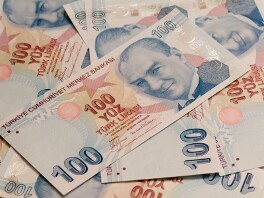The Turkish lira is strengthening against several major currency competitors on Tuesday as investors anticipate the central bank to cut interest rates. Forex markets are also optimistic that Ankara can establish swap lines with foreign central banks to mitigate its currency crisis. The lira has been rebounding since it crashed to a record low against the US dollar earlier this month.
According to a Reuters poll of economists, Turkeyâs Monetary Policy Committee is expected to slash rates by 50 basis points to 8.25% at its May meeting on Thursday. But the recent strength in the lira might give policymakers some leeway to lower them by as much as 1%. Last month, the central bank reduced its benchmark rate by 50 basis points to 8.75%.
At the same time, since officials maintain consistent repurchasing agreement auctions at lower rates than the benchmark, the central bank may choose to keep rates steady and still execute cheaper lending. Moreover, the institution might soon erect swap lines with foreign central banks, including the Bank of Japan (BoJ), the Bank of England (BoE), the Peopleâs Bank of China (PBoC), and the Federal Reserve, to boost foreign reserves.
Enver Erkan, an economist at Istanbul’s private investment company Tera Yatirim, told Xinhua:
It is unlikely to happen with the Federal Reserve which has traditionally set a high bar for establishing swap lines, but reports suggest that a deal is a possibility with the UK central bank or the Japanese central bank, that is why there is a positive expectation in markets.
Turkey is in need in the short term of foreign currency entries because of the outbreak that has caused a considerable drop in exports and tourism revenue.
So far, the official viewpoint of governments and central banks has been to only intervene in Turkey if it metastasizes into a financial crisis. But considering the state of its finances and the toll the coronavirus pandemic is taking on the economy, it may only be a matter of time before an economic collapse.
This year, its foreign currency reserves have cratered to $26 billion, while its 12-month foreign debt obligations are nearing $200 billion â half of this amount is due by August. The situation has been exacerbated by foreign investors selling the lira, forcing the central bank to find ways to prop up the currency.
President Recep Tayyip Erdogan recently blamed the liraâs slump on âthose who think they can destroy our economy, put shackles on our feet, corner us by using financial institutions abroad.â However, the government may be considering options that it initially dismissed, including requesting financial assistance or capital controls from the International Monetary Fund (IMF).
On the data front, retail sales tumbled at an annualized rate of 2% in March, down from the 8.5% gain in February. Automobile production, business confidence, and capacity utilization data are scheduled to be released this week.
The USD/TRY currency pair fell 1.26% to 6.7994, from an opening of 6.8854, at 16:22 GMT on Tuesday. The EUR/TRY tumbled 1.06% to 7.4353, from an opening of 7.5139.
If you have any questions, comments, or opinions regarding the Turkish Lira, feel free to post them using the commentary form below.
